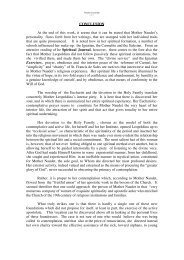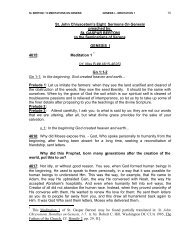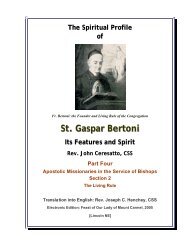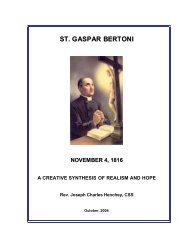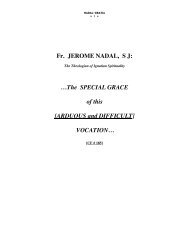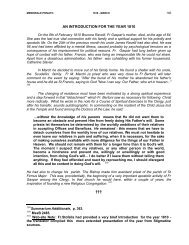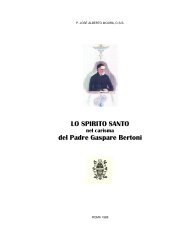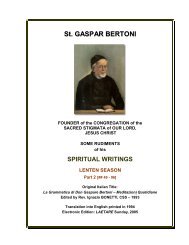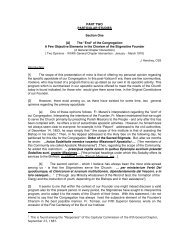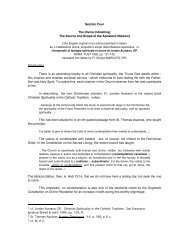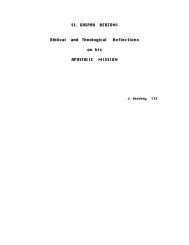[B.] St. IGNATIUS of LOYOLA Presentation: The ... - St. Gaspar Bertoni
[B.] St. IGNATIUS of LOYOLA Presentation: The ... - St. Gaspar Bertoni
[B.] St. IGNATIUS of LOYOLA Presentation: The ... - St. Gaspar Bertoni
You also want an ePaper? Increase the reach of your titles
YUMPU automatically turns print PDFs into web optimized ePapers that Google loves.
INTEGRE;SJ-OFM<br />
= 37 =<br />
1845: To speak <strong>of</strong> this most holy hero means to speak <strong>of</strong> the most perfect spirit <strong>of</strong> penance, <strong>of</strong><br />
the most sublime spirit <strong>of</strong> the Cross, <strong>of</strong> the most enflamed spirit <strong>of</strong> love towards the Crucified<br />
Christ. Hence, how well to him might those words <strong>of</strong> Christ in the Gospel be applied: Mt 16:24: If<br />
any man will come after me, let him deny himself: this is the spirit <strong>of</strong> penance. Take up his<br />
Cross: this is the spirit <strong>of</strong> the Cross; And follow Me : this is the spirit <strong>of</strong> love. <strong>The</strong>se are the<br />
principles, the progress, the consummation <strong>of</strong> holiness <strong>The</strong> way is clearly marked for anyone who<br />
would want to follow it: If any man will… This is for anyone who would choose to follow this way,<br />
not trusting in his own strength, but in the divine mercies: to come after Me. All <strong>of</strong> this is to<br />
speak <strong>of</strong> Francis. To attend to this message, as I am not sure on your part whether there is fear<br />
<strong>of</strong> my insufficiency, but this is an enkindling to the imitation <strong>of</strong> one who indeed imitated Christ so<br />
well.<br />
[1. If any man will come after me,let him deny himself…]<br />
1846: If any man will come after Me, let him deny himself. Let him deny himself: this is the<br />
spirit <strong>of</strong> penance. <strong>The</strong> effect <strong>of</strong> this spirit is to put to death all <strong>of</strong> man that is exterior, by denying<br />
himself what is his: denying those things that pertain to us. In the interior it means, denying<br />
oneself: denying ourselves. One denies those things that belong to him by renouncing them. It is<br />
relatively easy to deny one’s things. However, to deny oneself, means to leave self behind. It is<br />
quite laborious to give up oneself. That person leaves behind himself who sets aside that living<br />
the old life <strong>of</strong> Adam according to the flesh, in order to live according to the spiritual new life <strong>of</strong><br />
grace. This is how <strong>St</strong>. Gregory explained it [Hom 32 in Ev. T. 2, 325/2 A]. This occurs because<br />
the man who lives <strong>of</strong> this spirit <strong>of</strong> penance is led to abhor that which he previously loved, and to<br />
love that which… and so on. This is the thought <strong>of</strong> <strong>St</strong>. Ambrose [Serm 26, 6. App. t. 2, 427 C<br />
spurious]. Hence, in practice that person is a good penitent and a perfect denier <strong>of</strong> himself who<br />
previously was intemperate and has become very abstinent: previously he was impure, and then<br />
totally chaste: once he had been avaricious, and now he is supremely generous. This is <strong>St</strong>.<br />
Jerome’s description.<br />
1847: Observe then the change: here is a man who was but a little while earlier rather wealthy,<br />
and was much respected in the public squares because <strong>of</strong> his fine business sense. He was all<br />
eyes, and all hands in order to accumulate riches that were not sinful, but they were indeed<br />
earthly. This same man comes rather suddenly to the door <strong>of</strong> a church among the crowd <strong>of</strong> poor<br />
people, dressed as a poor person just like they, in exchange for his new and lordly garments.<br />
Now he is seen to be all committed, totally fervent, and full zealous in quest for poverty. And who<br />
is this man It is Francis. But, how can such an unusual change <strong>of</strong> his actions be explained And<br />
there was an even more stupendous change <strong>of</strong> affections. Let us ask him himself: But the things<br />
that were gain for me, the same I have counted for loss for Christ. Ph 3:7.<br />
1848: What merchant [Fr. Segneri so nobly and on his own comments this passage <strong>of</strong> <strong>St</strong>. Paul]<br />
- what merchant who buys pearls in the dark, replaces with them all his other gains, i.e., meaning<br />
his delights, his wealth, his reputation: then in the light <strong>of</strong> day it is seen that rather than pearls, he<br />
has bought mere glass. Such a man would not think <strong>of</strong> these quite valueless merchandise as a<br />
pr<strong>of</strong>it, but rather as a real loss - this was Francis. In the very pr<strong>of</strong>itable speculations <strong>of</strong> his<br />
merchant’s pr<strong>of</strong>ession he once contemplated his pleasures, he tasted the fruits <strong>of</strong> a smiling good<br />
fortune, he took his ease in the shade and in the breeze, happy in the vast credit and enjoying a<br />
good name, that the more this all spread, it produced for him many friends, and matured for him<br />
abundant means <strong>of</strong> every greater usefulness.<br />
1849: All this took place while he was still in the darkness, as unfortunately so many <strong>of</strong> us are<br />
right now, who might nonetheless speak to their own confusion <strong>of</strong> their laziness and sleepiness:<br />
<strong>The</strong> light <strong>of</strong> justice has not shined unto us… Ws 5:6: We do not know virtue under its genuine


![[B.] St. IGNATIUS of LOYOLA Presentation: The ... - St. Gaspar Bertoni](https://img.yumpu.com/33393889/37/500x640/b-st-ignatius-of-loyola-presentation-the-st-gaspar-bertoni.jpg)
